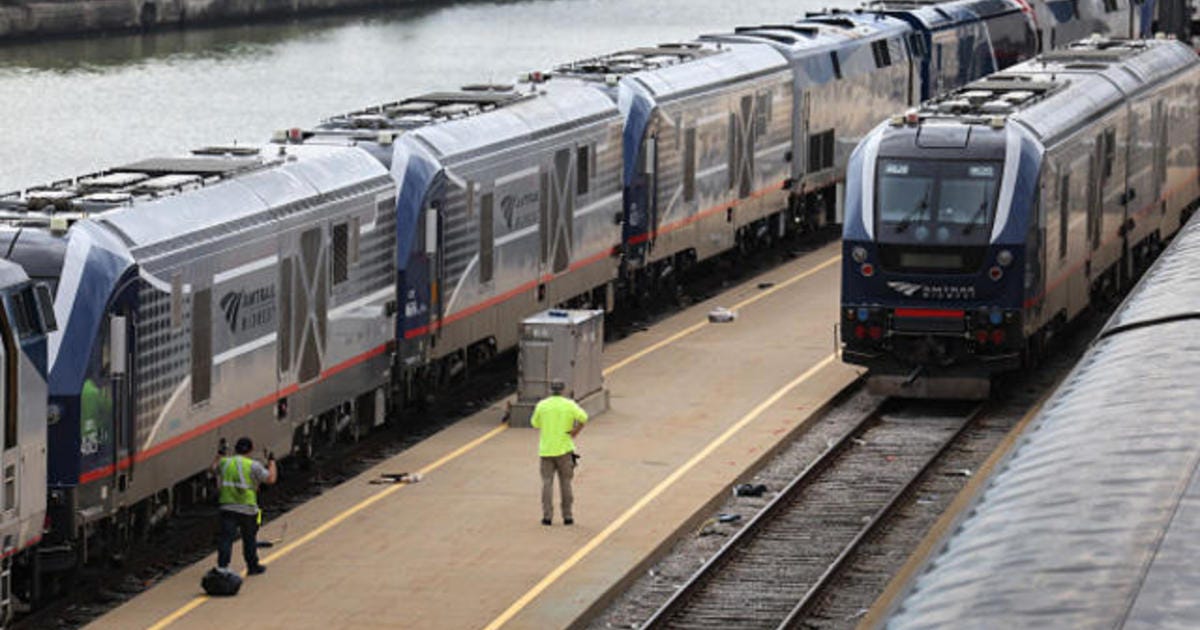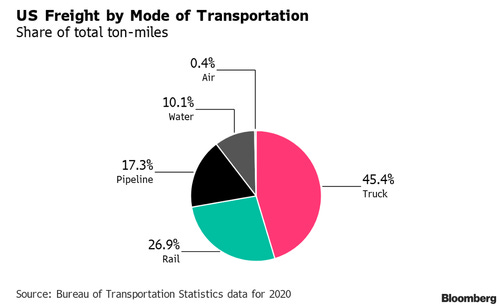Amtrak Expects A Rail Strike
All September Bets On Inflation Will Be Off If That Happens
This is a story that has come together from tiny threads here and there, to loom large over the American economy within the past 48 hours, as the threat of a railroad worker strike grows ominously more real.
The latest twist comes from the nation’s passenger rail carrier, Amtrak, which has started canceling its long-distance routes, to ensure passengers are not left stranded midway to a destination by a strike.
So it begins: on Wednesday afternoon, Amtrak said it will cancel all long distance trains starting Thursday, September 15 “to avoid possible passenger disruptions while enroute” as White House-led talks between freight-rail companies and unions continued in a race to avoid a rail-system shutdown Friday.
While Amtrak is not canceling its routes along the “Acela” corridor from Washington, DC, up through New England, it is canceling routes most everywhere else.
Not A New Crisis
Readers will recall this is not the first time a possible rail strike has seemed imminent. Two months ago the nation was left to wonder if a rail strike would happen then, as contract negotiations which have stalled out literally for years approached a deadline for action.
Given that the last time railroad workers had enjoyed a pay raise was before the COVID-19 pandemic, it is somewhat surprising there had not been a rail strike before now.
Crisis was averted then at the eleventh hour by both sides pursuing another round of talks to find a consensus, which has amounted to little more than kicking the railroad can down the train track until now.
Washington Has Not Been Helpful
As my fellow Substack writer Stephanie Braile has discussed in her Wholistic Newsletter, the Federal government has not been a force for good in resolving the labor dispute.
While these negotiations have been going on, what’s our government done? Published a long-ass document:
A Presidential Emergency Board — created by President Joe Biden through executive order in July — published a 119-page document in August that reviewed the arguments put forward by the railroad carriers and rail labor unions before issuing a variety of contract policy recommendations.
Having glanced at the document myself, is is indeed 119 pages of not very much (which makes it the perfect metaphor for the Biden Regime).
For its part, Congress is drafting “cram-down” legislation to deal with a strike should it happen, but no one in or around Congress, or who follows the nation’s Legislative Branch closely, gives the legislation much chance of success.
Introduced in the Senate on Monday by Roger Wicker, R.-Miss., and Richard Burr, R-N.C., the legislation would adopt the recommendations issued in August by the Presidential Emergency Board (PEB) that were meant to be used as the foundation for a new contract. Such action is supported by major business and shipper groups, including the U.S. Chamber of Commerce and the Fertilizer Institute.
But getting a divided Congress to quickly pass such settlement legislation offers little chance of resolving the dispute, according to John Brennan III, a former senior counsel for the Union Pacific Railroad.
Stephanie sums the situation up perfectly.
Well, given our feckless national leadership, don’t expect this to be resolved well if the rail companies and unions can’t solve it themselves.
Nothing Is Agreed Until Everything Is Agreed
A key element that largely escaped notice until the past few days is that, even though there are only two unions still rejecting the carriers’ contract offers, with the majority of the 12 unions representing railroad workers having come to contract terms already, all railroad workers in all unions are prepared to honor the picket lines should a strike arise.
Though the National Carriers’ Conference Committee announced Sunday, Sept. 11, that a majority of the rail worker unions have reached a tentative agreement with the railroad carriers, two craft unions — the Brotherhood Of Locomotive Engineers and Trainmen and the International Association of Sheet Metal, Air, Rail and Transportation Workers — Transportation Division (SMART-TD) — have not yet agreed to the terms of a new contract.
A “cooling off” period of the negotiations will expire at midnight on Thursday, Sept. 15 and if the two remaining unions do not agree to the terms of a new contract by 12:01 a.m. on Friday, then 100% of the country’s organized rail workforce is expected to strike.
Even the tens of thousands of railroad workers who have agreed to new contract terms with the carriers will join the strike of the two union holdouts, as if their own contracts did not exist.
To quote then-Prime Minister Theresa May on the status of Brexit negotiations to take the UK out of the European Union: “nothing is agreed until everything is agreed.” No railroad union is under contract until every railroad union is under contract.
Economic Impact Would Be Devastating
With over a quarter of US freight being delivered by rail, the consequences of a railroad strike would be devastating, with ripple effects throughout more than a few industries.
Some of those consequences are already being felt, as rail carriers are winding down certain routes and have already begun to refuse new cargoes of potentially hazardous materials such as ammonia fertilizer.
Fisher said railroads halting new cargoes is a move at ensuring trains aren't stranded if a labor strike materializes.
Other commodities are at risk, such as coal and crude product transports that could interrupt pre-winter stockpiling by utilities, triggering an increase in natural gas demand by power plant generators. Some estimates show railroads account for about a third or more of all US freight, meaning a strike would worsen supply chain snarls that could send inflation higher.
"Almost all ethanol is moved via rail and it is produced in the Midwest," noted Debnil Chowdhury of S&P Global Commodity Insights. "There is no easy substitute for rail and the US government will have to make decisions around blend targets if ethanol movement to demand centers are constrained due to a strike."
With a rail strike capable of producing sudden shortages in a variety of goods and commodities—especially coal and oil distillates to utilities seeking to stockpile energy reserves against the coming winter months—the US is staring at an extremely large and largely unpredictable supply shock, which will make short work of all punditry prognostications about the country having reached “peak” inflation.
(Economics lesson for Fed Chairman Jay Powell: raising interest rates will not change the situation surrounding a possible rail strike.)
Route Cancellations Are Sure To Boost September Inflation
With some freight shipments already being disrupted, and with further disruption likely to occur as the 12:01AM Friday deadline for securing new labor contracts vs striking draws near, it is increasingly certain that September’s inflation numbers will show a spike in a number of costs:
Coal and crude oil distillates will become immediately scarce, producing large-scale shifts in utility bills.
Ethanol availability would plummet, as would that of fuels that involve ethenol.
Ammonia fertilizer shipments would falter, with outsized ramifications for the late-fall harvest.
According to railroad workers, the practical impact of even a short strike would be a body blow to the economy.
[Jeremy] Hodges said that BNSF trains haul 135 truckloads of freight at minimum and if one were to drive from Galesburg to the Quad Cities they would not see 135 trucks.
For that reason, Hodges said he believed a strike, one lasting even for a short amount of time, would cause: “The biggest f****** recession you've ever seen.”
“I'm telling you right now this would be global. If the country of America does not move, you know what that does for the stock market? Cripples, and we're talking six hours could last 9-10 months,” Hodges said. ”Let's just say this: We've never seen it and nobody alive has seen the magnitude of that.”
According to NBC news, the last major freight rail strike occurred in April 1991. The strike lasted less than 24 hours as Congress invoked the Railway Labor Act to curb economic fallout.
With consumer price inflation already at 8.3% Year on Year, it would not take that long of a rail stoppage to push inflation above 10%.
An extended rail stoppage could dislocate the US economy to a sufficient degree that the media would have to bypass depictions of the economy in recession and go straight for depictions of the US economy in a depression.
An Unnecessary Supply Shock
With trains already being stopped in expectation of a strike beginning on Friday, and with the potential for almost a third of US freight shipments to be disrupted in an instant, this much must be acknowledged: this is one exogenous supply shock that has always been 100% avoidable.
As the unions and the carriers have been tap dancing around the possibility of a strike for the past two months, and have been dithering and dickering over new contracts since 2020, it is absurd to suggest that the issues between the unions and the carriers are intractable.
Even if a strike does happen, eventually there will be a contract between the unions and the carriers. That means both sides will have to compromise and accept less than they demand. The eventual contracts will satisfy no one—and that would be the best determinant of how good the contracts eventually will be.
There will be a contract. The unions should understand this. The carriers should understand this. One wishes the government was capable of understanding this (or, indeed, of understanding anything more complex than “water is wet”). The US cannot thrive with its freight terminals shut down for lack of railroad workers.
We have already seen in China what disrupting shipping traffic does to an economy. Why on Earth must we see it again here in the United States?






Best quote: "Having glanced at the document myself, is is indeed 119 pages of not very much (which makes it the perfect metaphor for the Biden Regime)."
"Given that the last time railroad workers had enjoyed a pay raise was before the COVID-19 pandemic"
Unions improve the lives of their members every bit as well as government improves the lives of its voters.